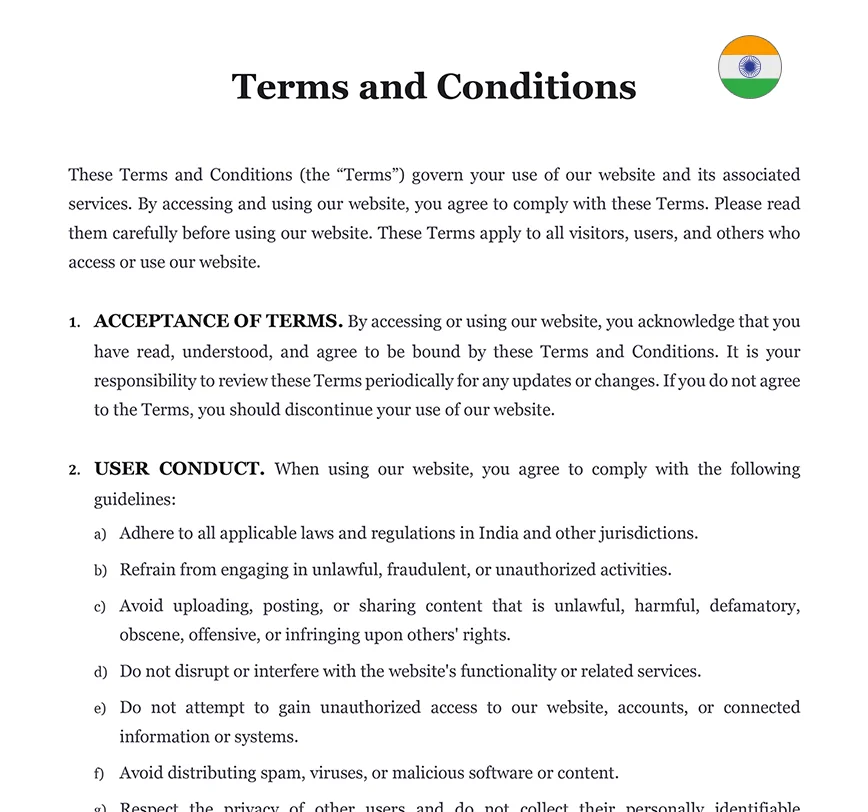Ready to use legal template
Drafted by experienced lawyers
Compliant with Indian law
Ready to use legal template
Drafted by lawyers
Compliant with Indian law
Home › Intellectual property › Terms and Conditions
Learn more about Website Terms and Conditions in India
Terms and Conditions are vital for businesses, establishing rules and rights governing product or service usage. Key aspects include content inclusion, clarity, legal requirements, benefits, consequences, updates, and user transparency. Complying with Terms and Conditions in India ensures compliance, risk mitigation, and a transparent user relationship.
📄 Related documents
Table of contents
-
What are Terms and Conditions and why are they important?
-
What should Terms and Conditions include?
-
How to draft comprehensive Terms and Conditions?
-
What legal requirements should be considered in India?
-
How can Terms and Conditions protect the rights of business and users?
-
What are the consequences of not having T&C in place?
-
Can Terms and Conditions be customized for different businesses?
-
How often should Terms and Conditions be reviewed?
What are Terms and Conditions and why are they important?
Terms and Conditions, often referred to as T&C or Terms of Service, are a set of rules and guidelines that govern the relationship between a business and its customers or users. They outline the terms of use, rules, obligations, and limitations that apply to the use of a product or service provided by the business. Terms and Conditions are crucial for several reasons.
They establish the legal agreement between the business and the users, ensuring that both parties are aware of their rights and obligations. By clearly defining the terms of use, such as payment terms, intellectual property rights, liability limitations, and dispute
resolution mechanisms, Terms and Conditions help protect the interests of the business and provide clarity to users.
Terms and Conditions help manage risk and liability. They can include provisions to safeguard the business against potential misuse, unauthorized activities, or violations of the agreement. This can help mitigate legal disputes and protect the business from financial and reputational harm.
Terms and Conditions foster transparency and trust. By clearly communicating the rules and expectations, businesses can set proper user expectations, build trust with their customers, and ensure a fair and consistent user experience.
Terms and Conditions can address important legal requirements and compliance obligations specific to a particular jurisdiction, such as data protection, privacy laws, and consumer rights. This helps businesses stay in compliance with the applicable laws and regulations.
What should Terms and Conditions include?
In a Terms and Conditions agreement in India, key elements should be included to ensure clarity and legal compliance. These typically encompass user rights and responsibilities, intellectual property protection, limitations of liability, privacy and data protection provisions, dispute resolution mechanisms, termination and suspension conditions, governing law, and the business’s right to amend the agreement. These components help establish a transparent framework that governs the relationship between the business and its users in India.
How to draft comprehensive Terms and Conditions?
To draft clear and comprehensive Terms and Conditions, it’s important to use language that is easily understandable and avoid complex legal jargon. Start by providing a concise introduction that clearly states the purpose of the agreement. Clearly outline the rights and responsibilities of both the business and the users, addressing key areas such as usage restrictions, intellectual property, payment terms, privacy, and dispute resolution. Make sure to cover important clauses, such as limitations of liability and indemnification. It’s also advisable to consult with a legal professional to ensure compliance with applicable laws and regulations. Regularly review and update the Terms and Conditions to reflect any changes in the business or legal landscape.
What legal requirements should be considered in India?
When creating Terms and Conditions in India, it is important to consider several legal requirements to ensure compliance with applicable laws. Here are some key legal requirements to consider:
1. Indian Contract Act, 1872: The Terms and Conditions must adhere to the provisions of the Indian Contract Act, which governs the formation and enforceability of contracts in India.
2. Consumer Protection Laws: If your business involves providing goods or services to consumers, you must comply with the consumer protection laws, such as the Consumer Protection Act, 2019, which safeguards consumer rights and imposes certain obligations on businesses.
3. Information Technology Act, 2000: If your business operates online or involves electronic transactions, you must comply with the provisions of the Information Technology Act, including ensuring the security and privacy of user data.
4. Payment and Financial Regulations: If your Terms and Conditions include provisions related to payments, you should comply with the applicable payment and financial regulations, such as the Payment and Settlement Systems Act, 2007, and the Reserve Bank of India’s guidelines.
5. Data Protection and Privacy Laws: India has recently enacted the Personal Data Protection Bill, which is expected to impose comprehensive data protection obligations. Ensure that your Terms and Conditions address the collection, use, storage, and protection of personal data in compliance with applicable data protection laws.
6. Intellectual Property Rights: If your Terms and Conditions involve intellectual property rights, such as copyright, trademarks, or patents, ensure that they address the protection and usage of intellectual property in accordance with Indian intellectual property laws.
7. Competition Laws: Consider the provisions of the Competition Act, 2002, which prohibits anti-competitive practices and unfair trade practices that may affect competition.
It is advisable to consult with legal professionals who specialize in Indian law to ensure that your Terms and Conditions meet the specific legal requirements applicable to your business activities in India.
How can Terms and Conditions protect the rights of business and users?
Terms and Conditions play a crucial role in protecting the rights and interests of both businesses and users. Here’s how they can provide protection:
➤ Clearly Outlining Rights and Obligations: Terms and Conditions establish a clear framework by outlining the rights, responsibilities, and obligations of both the business and the users. This helps set expectations and prevents misunderstandings or disputes.
➤ Defining Service Limitations: Terms and Conditions can define the limitations of the services or products provided by the business. This helps manage user expectations and ensures that the business is not held responsible for issues beyond its control or scope.
➤ Intellectual Property Protection: Terms and Conditions can address the ownership and use of intellectual property, such as copyrights, trademarks, or patents. They can specify how the business’s intellectual property is protected and how users are allowed to use or interact with it.
➤ Limiting Liability: By including disclaimers and limitations of liability, Terms and Conditions can help protect businesses from potential legal claims or damages. They can define the extent to which the business can be held responsible for any issues, errors, or losses that may occur.
➤ User Conduct and Compliance: Terms and Conditions can establish rules and guidelines for user conduct, ensuring that users comply with applicable laws, regulations, and ethical standards. This protects the business from potential misuse or abuse of its services or platforms.
➤ Privacy and Data Protection: Terms and Conditions can include provisions related to data collection, storage, and usage. They can outline how user data is handled, ensuring compliance with data protection laws and safeguarding user privacy.
➤ Dispute Resolution and Governing Law: Terms and Conditions can specify the mechanisms for dispute resolution, such as arbitration or mediation, and identify the governing law that applies. This provides clarity and consistency in addressing any potential legal issues.
By incorporating these protective measures, Terms and Conditions create a fair and transparent relationship between businesses and users, establishing a solid foundation for interactions and reducing the risk of conflicts or legal disputes.
What are the consequences of not having T&C in place?
Not having Terms and Conditions in place can have several consequences for a business. Without clear terms governing the use of products or services, there may be ambiguity regarding user rights, responsibilities, and limitations. This can lead to disputes, legal challenges, and potential liability issues. Without Terms and Conditions, businesses may also face challenges in protecting their intellectual property, enforcing payment terms, and addressing user misconduct. Additionally, the absence of a legal agreement can undermine the credibility and professionalism of a business, potentially impacting customer trust and relationships. Having comprehensive and well-crafted Terms and Conditions is crucial for mitigating risks and establishing a solid foundation for business operations.
Can Terms and Conditions be customized for different businesses?
Yes, Terms and Conditions can and should be customized to suit the specific needs and requirements of different businesses or industries. While there are certain fundamental elements that are common to most Terms and Conditions agreements, customization allows businesses to address industry-specific regulations, operational considerations, and unique business practices.
Different businesses may have distinct products, services, pricing structures, intellectual property concerns, user interactions, and liability considerations. Therefore, their Terms and Conditions should reflect these specific aspects. For example, an e-commerce platform may need to include provisions related to product listings, payment processing, shipping, and return policies, while a software-as-a-service (SaaS) company may focus on licensing, usage restrictions, and data security.
Customization also extends to the language and tone used in the Terms and Conditions. Businesses can tailor the wording to align with their branding, voice, and user experience. They can make the terms more user-friendly, concise, and easier to understand, particularly when dealing with consumer-facing businesses.
However, while customization is important, it’s crucial to ensure that the customized Terms and Conditions still comply with applicable laws and regulations. Certain clauses may be prohibited or unenforceable, so it’s essential to consult with legal professionals to ensure compliance and validity.
By customizing Terms and Conditions, businesses can effectively address their unique operational and legal requirements, enhance user experience, and provide clarity and transparency in their business relationships.
How often should Terms and Conditions be reviewed?
Terms and Conditions should be regularly reviewed and updated to stay compliant with changing laws and regulations in India. The frequency of these reviews depends on various factors, including the nature of the business, the industry it operates in, and the evolving legal landscape.
As laws and regulations pertaining to data privacy, consumer protection, and online transactions continue to evolve, it is essential for businesses to stay up-to-date with these changes. Regularly reviewing and updating the Terms and Conditions allows businesses to ensure that their agreements align with the latest legal requirements and provide adequate protection to both the business and its users.
It is recommended to conduct a thorough review of the Terms and Conditions at least once a year or whenever significant legal changes occur. This review should involve consulting with legal professionals who specialize in Indian laws and regulations, particularly those related to the specific industry or business operations.
In addition to legal updates, businesses should also consider reviewing their Terms and Conditions when there are changes in their products, services, pricing, or business models. This ensures that the agreement accurately reflects the current business practices and user expectations.
By proactively reviewing and updating the Terms and Conditions, businesses can mitigate legal risks, maintain compliance with Indian laws, and provide transparency and clarity to their users. Regular updates also demonstrate a commitment to legal compliance and build trust with customers and stakeholders.
SPECIAL OFFER
eCommerce
5 Document Package
Essential website/app policies for online business in India
Terms and ConditionsTemplate (.docx)
Save on attorney fees
310 client reviews (4.8/5) ⭐⭐⭐⭐⭐
Share information
Why Themis Partner ?
Make documents forhundreds of purposes
Hundreds of documents
Instant access to our entire library of documents for India.
24/7 legal support
Free legal advice from our network of qualified lawyers.
Easily customized
Editable Word documents, unlimited revisions and copies.
Legal and Reliable
Documents written by lawyers that you can use with confidence.




